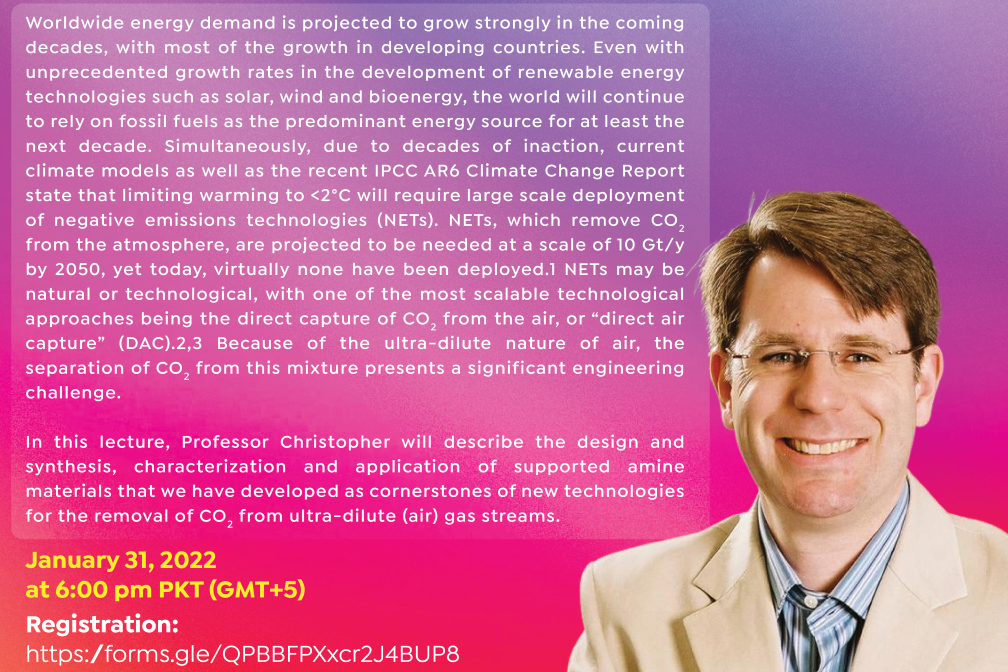
Event date:
Jan
31
2022
6:00 pm
CCEW-8: Development and Deployment of Negative Emissions Technologies (NETs): Humanity’s Moonshot for the 21st Century
Speaker(s)
Professor Christopher W. Jones from School of Chemical & Biomolecular Engineering, Georgia Institute of Technology, USA
Abstract
Worldwide energy demand is projected to grow strongly in the coming decades, with most of the growth in developing countries. Even with unprecedented growth rates in the development of renewable energy technologies such as solar, wind and bioenergy, the world will continue to rely on fossil fuels as the predominant energy source for at least the next decade. Simultaneously, due to decades of inaction, current climate models as well as the recent IPCC AR6 Climate Change Report state that limiting warming to <2°C will require large scale deployment of negative emissions technologies (NETs). NETs, which remove CO2 from the atmosphere, are projected to be needed at a scale of 10 Gt/y by 2050, yet today, virtually none have been deployed.1 NETs may be natural or technological, with one of the most scalable technological approaches being the direct capture of CO2 from the air, or “direct air capture” (DAC).2,3 Because of the ultra-dilute nature of air, the separation of CO2 from this mixture presents a significant engineering challenge.
In this lecture, I will describe the design and synthesis, characterization and application of supported amine materials that we have developed as cornerstones of new technologies for the removal of CO2 from ultra-dilute (air) gas streams.4 These chemisorbents efficiently remove CO2 from simulated flue gas streams, and the CO2 capacities are actually enhanced by the presence of water, unlike in the case of physisorbents such as zeolites. We will describe the development of these materials, how they integrate into scalable DAC technologies, as well as their key physicochemical structure-property relationships. DAC technologies offer an interesting case study for the parallel design of materials, unit operations, and processes in chemical engineering.
In this lecture, I will describe the design and synthesis, characterization and application of supported amine materials that we have developed as cornerstones of new technologies for the removal of CO2 from ultra-dilute (air) gas streams.4 These chemisorbents efficiently remove CO2 from simulated flue gas streams, and the CO2 capacities are actually enhanced by the presence of water, unlike in the case of physisorbents such as zeolites. We will describe the development of these materials, how they integrate into scalable DAC technologies, as well as their key physicochemical structure-property relationships. DAC technologies offer an interesting case study for the parallel design of materials, unit operations, and processes in chemical engineering.
Professor Jones is the John F. Brock III School Chair and Professor of Chemical & Biomolecular Engineering at Georgia Tech. Dr. Jones leads a research group that works on materials, catalysis and adsorption. He is known for his extensive and pioneering work on materials that extract CO2 from ultra-dilute mixtures such as ambient air, which are key components of direct air capture (DAC) technologies. He also has produced an extensive body of work in catalysis. Jones’ work in both catalysis and CO2 separation has been recognized with awards from numerous organizations
Registration link

